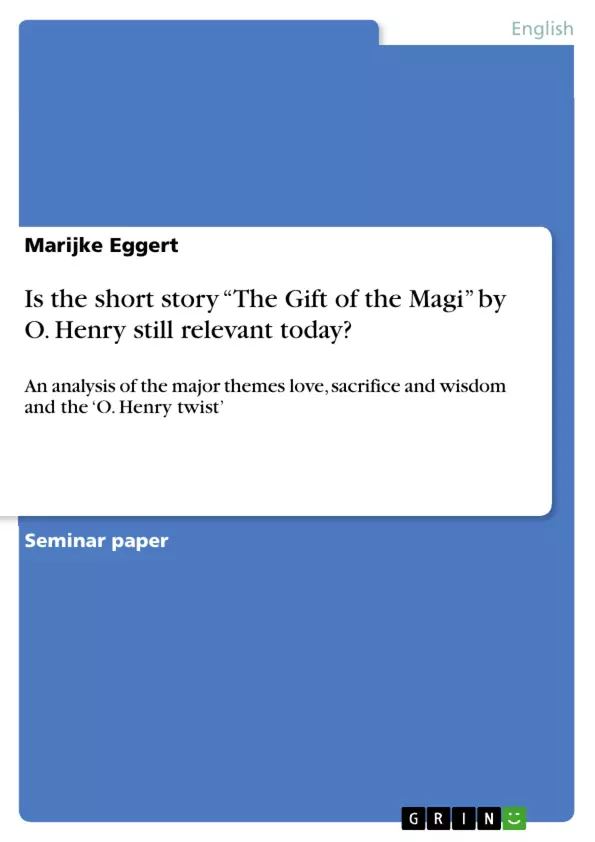"The Gift of the Magi" is one of O. Henry's most famous short stories. In this paper I will have a closer look at the short story “The Gift of the Magi“ by O. Henry. I will start by analyzing the major themes love, sacrifice and wisdom. Furthermore, I will also have a look at the ending of the story, which is an example of the so-called ‘O. Henry twist’. By analyzing these different aspects of the short story I will conclude with the meaning for the reader today and the question whether this short story is worth reading.
Table of Contents
- Introduction
- The Major Themes Love, Sacrifice and Wisdom
- The 'O. Henry twist'
- Conclusion
Objectives and Key Themes
This paper analyzes O. Henry's short story "The Gift of the Magi," focusing on its enduring relevance. The analysis examines the interplay of love, sacrifice, and wisdom within the narrative, culminating in an exploration of the story's famous "O. Henry twist" ending.
- The importance of love over material possessions
- The theme of sacrifice and its impact on the characters' relationship
- The role of wisdom and its unexpected manifestation
- The significance of the "O. Henry twist" and its effect on the reader
- The story's continued relevance in contemporary society
Chapter Summaries
Introduction: This introductory chapter sets the stage for the analysis of O. Henry's "The Gift of the Magi." It outlines the paper's objectives: to examine the major themes of love, sacrifice, and wisdom, as well as the story's surprising "O. Henry twist" ending. The introduction establishes the context for understanding the story's enduring appeal and its relevance to contemporary readers, posing the central question of whether the story remains meaningful today.
The Major Themes Love, Sacrifice and Wisdom: This chapter delves into the core themes of O. Henry's story. It explores how the characters, Della and Jim, demonstrate the supremacy of love over material wealth through their actions and dialogues. Their willingness to sacrifice their most prized possessions – Della's hair and Jim's watch – highlights the depth of their love and the importance of selfless giving. The chapter uses specific examples from the text, including the allusions to the Queen of Sheba and King Solomon, to illustrate the high value placed on these possessions and the significance of their sacrifice. The narrative concludes by connecting the characters' actions to the parable of the Magi, emphasizing the wisdom inherent in their unselfish love and sacrifice.
The 'O. Henry twist': This section focuses on the story's characteristic surprise ending, a hallmark of O. Henry's writing style. It analyzes the impact of the "O. Henry twist" on the reader, highlighting the emotional response evoked by the revelation of the characters' actions. The chapter contrasts the public's love for this type of ending with some critical perspectives that viewed the endings as quickly dating. The analysis emphasizes the unexpected nature of the resolution and how it ultimately reinforces the themes of love and sacrifice explored earlier in the paper. The chapter underscores how the characters' kind and accepting behavior forms the surprising and meaningful conclusion.
Keywords
O. Henry, The Gift of the Magi, love, sacrifice, wisdom, "O. Henry twist," surprise ending, short story, thematic analysis, literary techniques, enduring relevance.
Frequently Asked Questions: O. Henry's "The Gift of the Magi" - A Thematic Analysis
What is the purpose of this document?
This document provides a comprehensive preview of a thematic analysis of O. Henry's short story, "The Gift of the Magi." It includes a table of contents, objectives, key themes, chapter summaries, and keywords.
What are the main themes explored in the analysis?
The analysis focuses on the interplay of love, sacrifice, and wisdom in "The Gift of the Magi," culminating in an exploration of the story's famous "O. Henry twist" ending. It examines the importance of love over material possessions, the impact of sacrifice on the characters' relationship, and the unexpected manifestation of wisdom within the narrative.
What is the "O. Henry twist," and how is it analyzed?
The "O. Henry twist" refers to the story's surprise ending, a hallmark of O. Henry's writing style. The analysis explores the impact of this twist on the reader, examining the emotional response it evokes and contrasting popular appreciation with some critical perspectives. It emphasizes how the twist ultimately reinforces the themes of love and sacrifice.
What are the key chapters and their content?
The analysis is structured into an introduction, a chapter exploring the major themes (love, sacrifice, and wisdom), a section dedicated to the "O. Henry twist," and a conclusion. The introduction sets the stage, the second chapter delves into the thematic depth, the third focuses on the surprise ending, and the conclusion synthesizes the findings. Each chapter uses textual evidence to support its analysis.
What is the overall argument or conclusion of the analysis?
The analysis aims to demonstrate the enduring relevance of "The Gift of the Magi" by examining its core themes and the impact of its unique narrative structure. It argues that the story's message of selfless love and sacrifice remains meaningful in contemporary society.
What are the key takeaways from this analysis of "The Gift of the Magi"?
Key takeaways include a deeper understanding of O. Henry's writing style, the exploration of universal themes of love and sacrifice, an analysis of the impact of the surprise ending, and a consideration of the story's continued relevance. The analysis offers valuable insights into literary techniques and thematic interpretations.
What keywords are associated with this analysis?
Keywords include: O. Henry, The Gift of the Magi, love, sacrifice, wisdom, "O. Henry twist," surprise ending, short story, thematic analysis, literary techniques, enduring relevance.
- Arbeit zitieren
- Marijke Eggert (Autor:in), 2008, Is the short story “The Gift of the Magi” by O. Henry still relevant today?, München, GRIN Verlag, https://www.grin.com/document/199131



